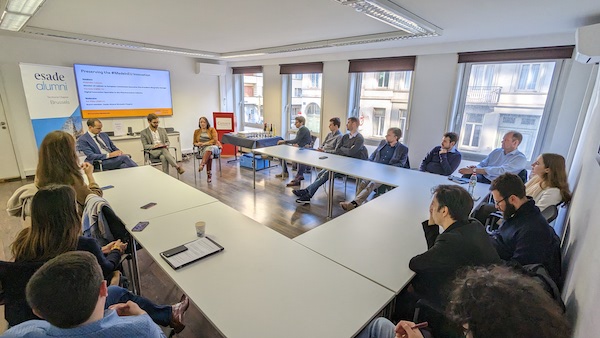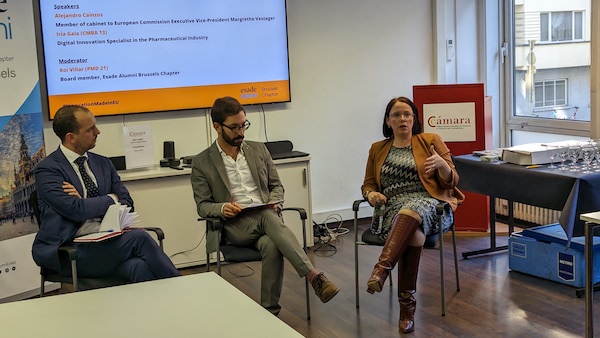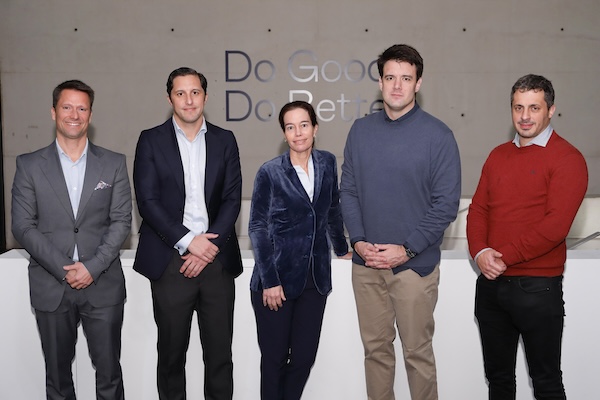Protecting and promoting innovation in Europe as a bid for the future was one of the core topics at the Brussels Chapter of Esade Alumni.

Compared to other regions in the world, Europe is facing challenges in effectively transforming innovative ideas into viable companies.
To reflect on how Europe can create the right conditions for quicker and more ambitious innovation, the Brussels Chapter held the session entitled Preserving the #MadeInEU. The session featured Alejandro Cainzos, member of cabinet to European Commission Executive Vice-President Margrethe Vestager, and Iria Gala (CMBA 13), expert in Digital Innovation in the Pharmaceutical Industry, who debated the actions being taken in this direction.
Alejandro Cainzos was invited because he is a member of the cabinet of Margrethe Vestager, who advises on the international aspects of her portfolio, namely the geopolitics of technology, cybersecurity and defense. Iria Gala, in turn, has led the digital innovation teams at several pharmaceutical companies in Europe for the past 15 years and has overseen initiatives in Europe, the Middle East and Africa. After the gathering, Gala stressed that “there are plenty of opportunities to develop, attract and retain innovation in the EU. Regulations, companies and people’s needs should be realigned to allow progress as opposed to process, and to guarantee that we retain the top talent to ensure that this happens.”
Geopolitical framework
The impact of geopolitical instability and the recent crises in energy and raw materials, as well as the quickly evolving innovation scene in European industry, are all real factors, coupled with staff cuts in the leading consumer technology companies and investments in emerging technologies like generative AI.
Furthermore, on the governance side, there are protectionist policies like the United States’s Inflation Reduction Act and China’s compulsory technology transfer agreements. In Europe, the Chips Act is easing decisions on the location of semiconductor factories and laboratories. All of this shows that the struggle over innovation is escalating among the three fronts, as we saw as the COVID-19 vaccines were being developed, when the Trump administration tried to relocate the German company Biontech to US soil.

Challenges and opportunities
As reported by Roi Villar (PMD 21), a member of the Board of Directors of the Brussels Chapter of Esade Alumni, the session concluded that certain key points have to be addressed in order for innovation to flourish in Europe:
-Despite the good initial figures on innovation (number of startups and patents), growth still remains a challenge.
-Public RDI infrastructures in Europe are important, even though research and innovation are increasingly expensive, which could lead to a concentration of RDI.
-Talent, learning, acceptance of remote work and digital nomads and recognition of skills would help Europe have a talented pool of workers that would enable innovation to flourish.
-The interpretation of the regulations and fragmentation of the single market add an additional step when attempting to expand innovation among countries. A drive for harmonization among the member states is needed.
-Our fragmented capital markets hold back strong competition among emerging companies. And venture capital’s support of startups is still quite low, which hinders knowledge transfer.
-There should be broader awareness of the VUCA world in which we live, from the base to the top of any organization. Global alliances and value chains with other blocs should also be considered.
-Europe’s diverse cultures, languages and countries are one of its best assets in its bid to become a strong innovator.
Villar added, “World Innovation Day has sparked an extraordinary, diverse and multidisciplinary analysis of the European ecosystem, which enables adaptation for success in an ever-changing future. We learned ways of taking advantage of Europe’s strengths (like our research infrastructures, diversity and pioneering regulations) in order to overcome future challenges (talent mobility and lack of capital investment).”



































